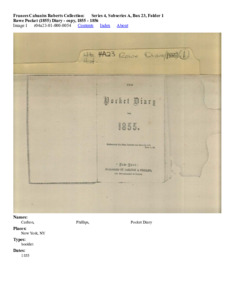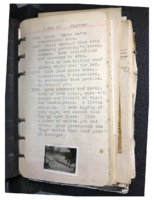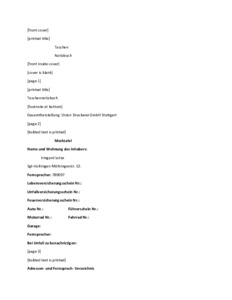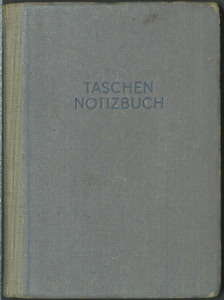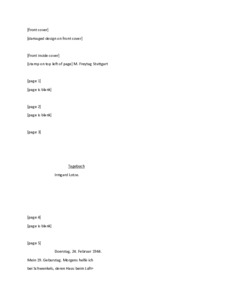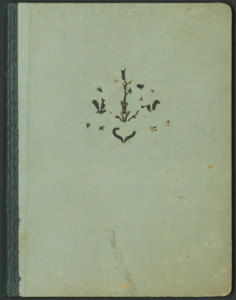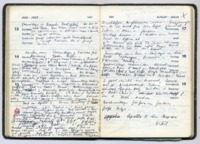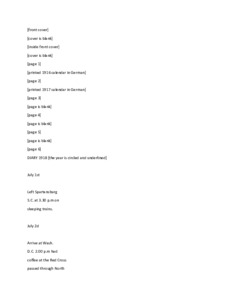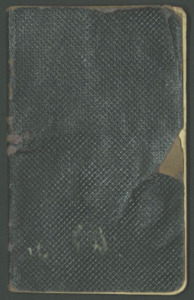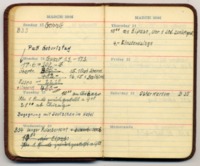
Browse Items (18 total)
Sort by:
-
Excerpt from Col. Kingsley Andersson's journal.
These diary entries appear to be photographs of the Kingsley Andersson diaries held at the Hoover Institute, which were requested for view by Dudley Burwell. Discusses aspects of the writer's command and daily life from January to March of 1944 while in Italy. The diary mentions an Engineer named Burwell. -
Transcript of Irmgard Stuhlinger 1948 Journal
Irmgard Stuhlinger was the wife of Ernst Stuhlinger, a scientist acquired in Operation Paperclip. In this journal she details her daily life starting from January 1st, 1948 to December 31st, 1948. She touches on the topics of post-secondary education, family events, and holidays in the post-war period. At the end of the journal, she includes an entry about the year to come. -
Irmgard Stuhlinger 1948 Journal
Irmgard Stuhlinger was the wife of Ernst Stuhlinger, a scientist acquired in Operation Paperclip. In this journal she details her daily life starting from January 1st, 1948 to December 31st, 1948. She touches on the topics of post-secondary education, family events, and holidays in the post-war period. At the end of the journal, she includes an entry about the year to come. -
Transcript of Irmgard Stuhlinger 1944-1945 Journal
Irmgard Stuhlinger was the wife of Ernst Stuhlinger, a scientist acquired in Operation Paperclip. In this journal she details her daily life starting from her 19th birthday under the rule of the Third Reich, toward the end of the second World War. She touches on topics such as war, post-secondary education, death of family members, the acquisition of housing, and holidays in the latter part of the war. -
Irmgard Stuhlinger 1944-1945 Journal
Irmgard Stuhlinger was the wife of Ernst Stuhlinger, a scientist acquired in Operation Paperclip. In this journal she details her daily life starting from her 19th birthday under the rule of the Third Reich, toward the end of the second World War. She touches on topics such as war, post-secondary education, death of family members, the acquisition of housing, and holidays in the latter part of the war. -
Excerpt from the journal of Irmgard Stuhlinger.
Stuhlinger attended the launch of Apollo 11 with her husband Ernst Stuhlinger, then the Associate Director for Science at Marshall Space Flight Center. In the entries, she describes her reaction to the launch and the successful lunar landing and makes note of the celebrations she and her family attended in Huntsville. She also records her daily activities, including socializing with neighbors and shopping with her children. A translation is included. -
Transcript of the World War I diary of Archie Duncan Shannon.
Archie Shannon was a farmer who served in Company G of the 1st Pioneer Infantry in World War I. Shannon was born in Limestone County, Alabama on November 19, 1891, and at the time of his draft registration on June 5, 1917, he lived in Ardmore, Tennessee. Shannon reported for military duty on September 18, 1917 and entered training at Camp Pike, Arkansas.
This diary covers Shannon's experiences in the U.S. Army from July 1, 1918 to July 7, 1919. He describes his journey to France and details everyday life as a soldier, especially the discomforts of life on the front in both the Marne and Verdun sectors. Shannon discusses bathing and sleeping arrangements, gas masks, air raids, and the terrible sights of war-torn France while repairing roads and burying dead soldiers. Shannon includes descriptions of his involvement in the Meuse-Argonne Offensive, noting the continuous shelling, gas attacks, and miserable weather conditions. He also describes his company's reaction to the Armistice, writing, "Many happy hearts in our company everyone seems to take life anew."
Shannon spent the rest of his World War I service in Belgium, Luxembourg, and Germany, and he returned to the United States on July 7, 1919. A list of soldier names and hometowns is recorded in the back of the diary. Shannon died on May 20, 1969 and is buried in Gatlin Cemetery in Ardmore, Alabama. -
World War I diary of Archie Duncan Shannon.
Archie Shannon was a farmer who served in Company G of the 1st Pioneer Infantry in World War I. Shannon was born in Limestone County, Alabama on November 19, 1891, and at the time of his draft registration on June 5, 1917, he lived in Ardmore, Tennessee. Shannon reported for military duty on September 18, 1917 and entered training at Camp Pike, Arkansas.
This diary covers Shannon's experiences in the U.S. Army from July 1, 1918 to July 7, 1919. He describes his journey to France and details everyday life as a soldier, especially the discomforts of life on the front in both the Marne and Verdun sectors. Shannon discusses bathing and sleeping arrangements, gas masks, air raids, and the terrible sights of war-torn France while repairing roads and burying dead soldiers. Shannon includes descriptions of his involvement in the Meuse-Argonne Offensive, noting the continuous shelling, gas attacks, and miserable weather conditions. He also describes his company's reaction to the Armistice, writing, "Many happy hearts in our company everyone seems to take life anew."
Shannon spent the rest of his World War I service in Belgium, Luxembourg, and Germany, and he returned to the United States on July 7, 1919. A list of soldier names and hometowns is recorded in the back of the diary. Shannon died on May 20, 1969 and is buried in Gatlin Cemetery in Ardmore, Alabama. -
Excerpt from the 1946 daybook of William A. Schulze.
This excerpt includes pages 36 and 37 of the daybook. In the entries, Schulze notes his travel to Fort Bliss, Texas from Aberdeen, Maryland. A translation is included.
